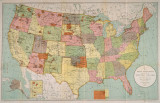| Title |
Annual Report of the Commissioner of Indian Affairs - 1906 |
| Subject |
Indian reservations; Federal government; Indians of North America; Maps; Work; Livestock; Food; Indians of North America--Education; Land use; Allotment of land; Treaties; Agriculture; Railroads; Timber; Religion; Natural resources; Paiute Indians--History; Employment (Economic theory); Education; Missionaries; Irrigation; Water rights; Courts; Indigenous peoples--North America |
| Keywords |
Annual Report; Indian Agency; Reservations; Land Rights; Resources; Native Americans |
| Publisher |
Digitized by J. Willard Marriott Library, University of Utah |
| Tribe |
Paiute |
| Language |
eng |
| Description |
Excerpts concerning Utah from the Annual Report of the Commissioner of Indian Affairs - Courtesy of the University of Wisconsin Digital Collections. The Commissioner of Indian Affairs discusses industriousness and work ethic among the Indians, the distribution of rations and annuities, court rulings regarding land rights, enrollment and performance at Indian schools, etc. The Commissioner discusses appropriations made to bring the Paiutes out of destitution |
| Type |
Text |
| Coverage |
Washington (D.C.) |
| Format |
application/pdf |
| Rights |
Digital Image © 2011 America West Center. All Rights Reserved |
| ARK |
ark:/87278/s6dj8bbd |
| Creator |
Commissioner of Indian Affairs; Leupp, Francis E. (Francis Ellington), 1849-1918 |
| Date |
1906 |
| Spatial Coverage |
Utah; Washington (D.C.) |
| Setname |
uaida_main |
| ID |
375075 |
| Reference URL |
https://collections.lib.utah.edu/ark:/87278/s6dj8bbd |



































































































































































































































































